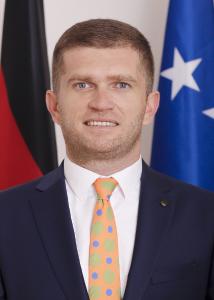Unanimous Judgement
Following the vote of no confidence and overthrow of government, conflict erupted about whether the constitution dictates that this would have to entail re-elections, or whether the President is authorised to mandate another candidate with forming a government who holds the necessary support in parliament. The Constitutional Court´s unanimous decision legitimises the Decree of the President, and paves the legal route towards voting on a government under Hoti. The defiance of the VV, despite having been requested four times by the President to appoint a candidate for the Prime Minister´s Office, constitutes a refusal to form a government according to the Constitutional Court.
Constitutional Court under Pressure
The decision eagerly anticipated by all parties now at least provides legal clarity on further steps when it comes to forming a new government. Prior to these events, all involved parties had exerted undue pressure on the Constitutional Court and made public comments in an attempt to influence the decision. The VV, which emerged as the strongest party from parliamentary elections of 6 October 2019, argues on the basis of previous precedent cases and selected articles from the constitution stipulating that re-elections should be held following a motion of no-confidence. The same perspective was shared by Vjosa Osmani, Chairwoman of the Assembly and lead LDK candidate during the last parliamentary elections. On the other hand, in particular the President Thaçi, the LDK and their prospective coalition partners argued that the successful motion of no-confidence would not necessarily result in re-elections, and that this would depend on the will of political parties to create a majority – which has been achieved, at least the coalition statements clearly indicate this. It was against this backdrop that Thaçi took action on 30 April. After the VV lodged an appeal, the Constitutional Court had, however, issued a preliminary injunction on 1 May to prevent the rapid formation of a new government. The final decision dated 28 May now sheds light on this situation.
Litmus Test for VV
Vetëvendosje had explained from the outset that they will only respect the decision if it is “fair": observers interpret this adjective in the sense of: “for the benefit of VV”. At the same time, VV party representatives warned against protests by their supporters should a Constitutional Court ruling be made that does not meet their expectations. The “protest preparations” highlight the fact that these are not merely empty threats. Directly before the Constitutional Court ruling, an estimated 2,000 supporters of the VV protested in Pristina city centre – while respecting rules of distance and hygiene – during a peaceful “test demonstration”. The way in which the decision is dealt with will also become a litmus test for the party: do they accept an independent judiciary and separation of powers, even to their own political detriment, or do they reflect on a past as a protest movement with elements of political violence? It is also most notably an acid test for the still acting Prime Minister Albin Kurti, who, particularly after the election on 6 October underwent a transformation from Saul to Paul and styled himself as a responsible, even statesmanlike reformer and fighter against corruption, and thus received favourable support from the international community, too.
New Government Faces Major Challenges
According to the Constitutional Court ruling, it is anticipated that a new government under Avdullah Hoti will be formed swiftly; those in Pristina predict the formation of a new government on 1 June at the latest. In addition to the LDK, the AAK of the former Prime Minister Ramush Haradinaj and NISMA under Fatmir Limaj will also belong to this government. What´s more, it will be dependent on votes from representatives of the minorities in order to achieve a narrow absolute majority of 61 to 63 seats in parliament (of 120). This is certainly not a comfortable situation in view of the challenges confronting Kosovo! There is also strain on the new government: hopes placed by large sections of the predominantly young population (as well as the international community) on a government without the old cadres of the Kosovo Liberation Army UÇK have been dashed.
There will be no grace period for the new government due to a highly polarised domestic political situation – the VV feel as though they were robbed of their election victory. The LDK itself is confronted by various internal party dynamics and it must strive for unity. However, the greatest challenge is to counter the effects of the corona pandemic on the country´s economy. Important industries such as gastronomy, the hotel sector and the building trade are severely affected. That´s why it is imperative to react quickly. Interest groups and some experts have levelled criticism against the Kurti government for their slow response, which means that a Hoti government must take rapid action. According to Hoti´s plans, the government will spend some one billion euros on tackling damage caused by the pandemic, which will come from various sources (reduction of capital investments, money from the pension fund and the privatisation process, but also an increase of government debt). In addition to credibly fighting against corruption and making progress in the rule of law, the acid test facing the Hoti government will be the revival of normalisation talks with Serbia. The introduction of 100% tariffs in November 2018 by the former Prime Minister Haradinaj, had brought this dialogue to a standstill.
Topics
Provided by
Foundation Office KosovoAbout this series
The Konrad-Adenauer-Stiftung is a political foundation. Our offices abroad are in charge of over 200 projects in more than 120 countries. The country reports offer current analyses, exclusive evaluations, background information and forecasts - provided by our international staff.







You need to sign in in order to comment.